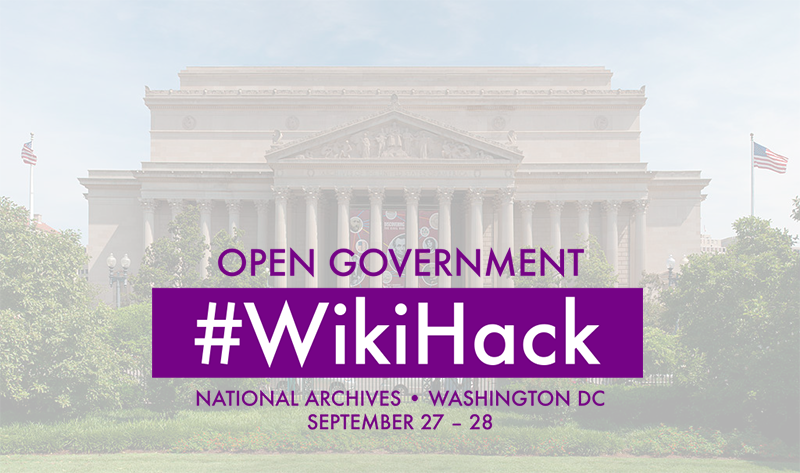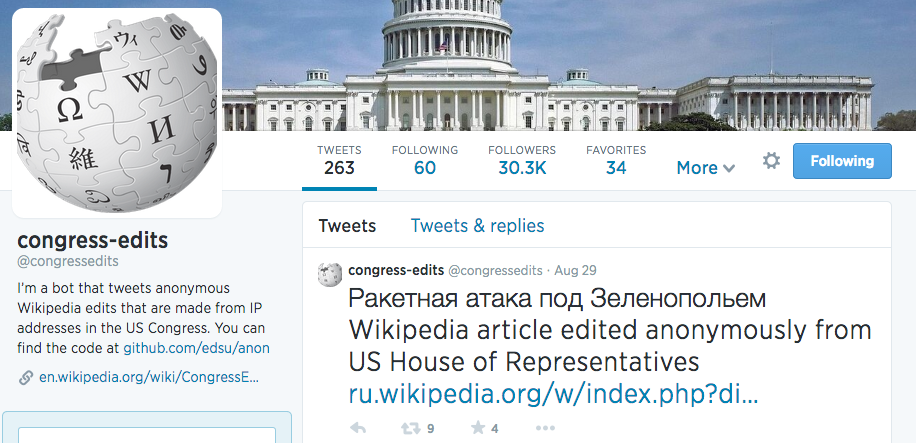A weekend with Wikidata: The Open Government WikiHack, Part 2
Posted by James on September 8th, 2014
Wikimedia DC held its first ever Open Government WikiHack this past April, at the offices of the Sunlight Foundation. We spent the weekend experimenting with open data repositories, including those made available by the Sunlight Foundation, trying to figure out how we can take this data and use it to improve Wikipedia. We imagined a world of Wikipedia articles that update automatically as new information comes to light. This month, we are going to continue imagining.
The link between Wikipedia and structured data is Wikidata, a fairly new project spearheaded by the Wikimedia Deutschland chapter. The basic principle is that while Wikipedia exists in over 200 languages, data exists as data regardless of language. For example, the population of South Africa is 54,002,000, according to a 2014 estimate. You can find this datum in the Wikipedia article on South Africa, alongside the right side of the article. You can also find data on South Africa in its Wikidata entry, Q258. In the long run, data used in Wikipedia articles will be fed out of Wikidata, rather than posted directly on each article, so that the data will be automatically available in the many language editions of Wikipedia.
Wikidata is fairly new to all of us, so we have invited James Forrester to give a presentation on Wikidata and how we can help improve it. Mr. Forrester is a product manager at the Wikimedia Foundation, focused on improving Wikipedia’s editing experience, and has also been a very active participant on Wikidata from the beginning. We are very excited to see him come to the National Archives and help us make Wikidata part of the broader Open Data conversation we’re having in the nation’s capital.
We would love to have you participate in our WikiHack, which will take place on September 27–28, regardless of experience with coding or editing Wikipedia. You can register for free at EventBrite. Hope to see you there!
Wikimedia DC held its first ever Open Government WikiHack this past April, at the offices of the Sunlight Foundation. We spent the weekend experimenting with open data repositories, including those made available by the Sunlight Foundation, trying to figure out how we can take this data and use it to improve Wikipedia. We imagined a world of Wikipedia articles that update automatically as new information comes to light. This month, we are going to continue imagining.
The link between Wikipedia and structured data is Wikidata, a fairly new project spearheaded by the Wikimedia Deutschland chapter. The basic principle is that while Wikipedia exists in over 200 languages, data exists as data regardless of language. For example, the population of South Africa is 54,002,000, according to a 2014 estimate. You can find this datum in the Wikipedia article on South Africa, alongside the right side of the article. You can also find data on South Africa in its Wikidata entry, Q258. In the long run, data used in Wikipedia articles will be fed out of Wikidata, rather than posted directly on each article, so that the data will be automatically available in the many language editions of Wikipedia.
Wikidata is fairly new to all of us, so we have invited James Forrester to give a presentation on Wikidata and how we can help improve it. Mr. Forrester is a product manager at the Wikimedia Foundation, focused on improving Wikipedia’s editing experience, and has also been a very active participant on Wikidata from the beginning. We are very excited to see him come to the National Archives and help us make Wikidata part of the broader Open Data conversation we’re having in the nation’s capital.
We would love to have you participate in our WikiHack, which will take place on September 27–28, regardless of experience with coding or editing Wikipedia. You can register for free at EventBrite. Hope to see you there!

